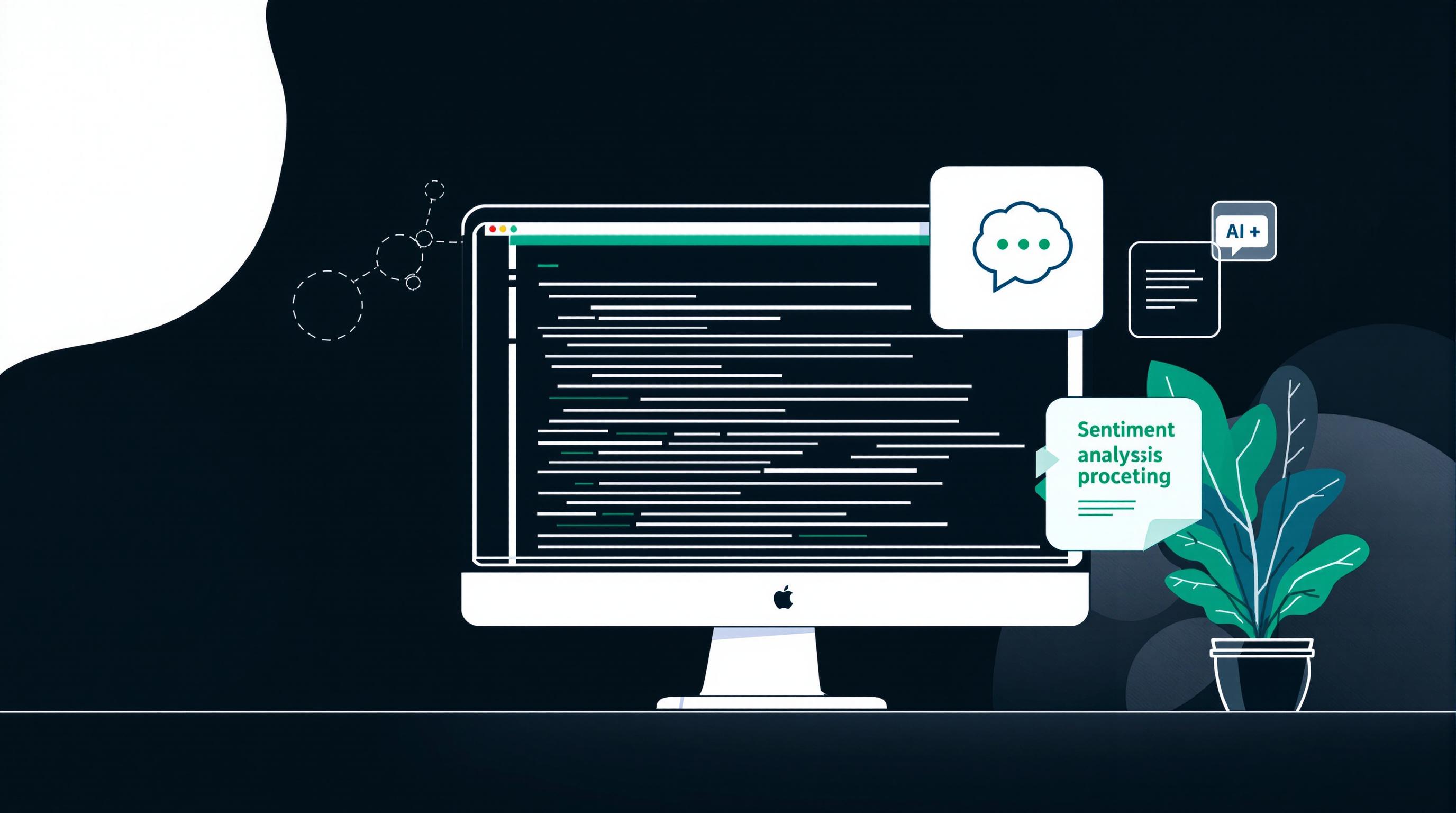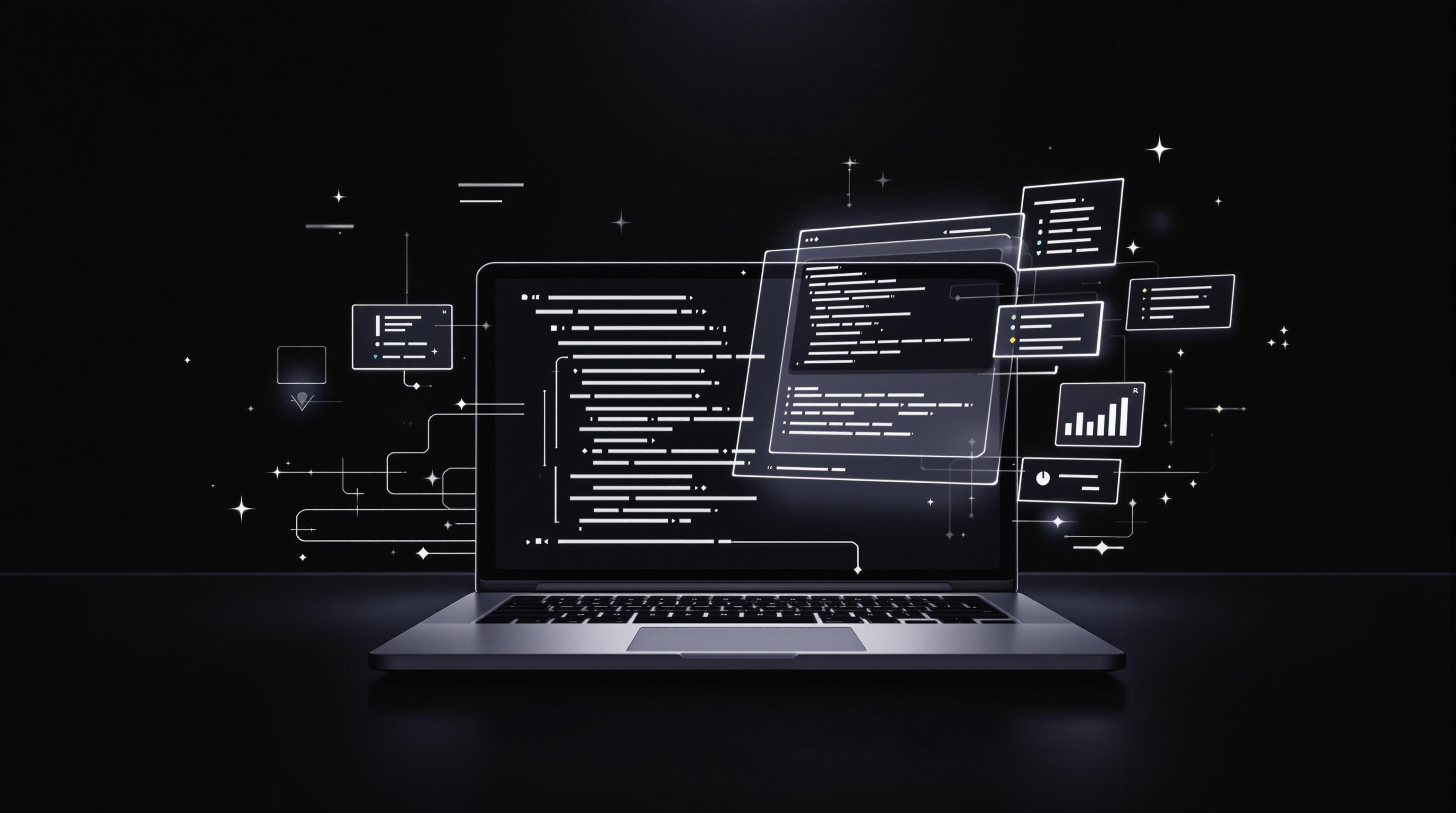Want to scrape websites without getting into trouble? Here's what you need to know.
Web scraping lets you automatically collect data from websites, but doing it wrong can cause serious problems. Here's a quick guide to scraping data the right way:
Key things you must do:
- Check if the website has an API first - always use this instead of scraping if available
- Follow the website's robots.txt rules and terms of service
- Add delays between requests (3-5 seconds) to avoid overloading servers
- Only collect public data, never personal information
- Properly secure and encrypt any data you gather
Common mistakes that can get you in trouble:
- Scraping too aggressively and crashing servers
- Collecting private/personal data without permission
- Ignoring a website's terms of service
- Not properly securing scraped data
Recent legal cases like HiQ vs LinkedIn and Cambridge Analytica show what happens when companies ignore these rules - lawsuits, fines, and damaged reputations.
The bottom line? Web scraping is powerful but needs to be done responsibly. Follow the rules above to collect data legally and ethically while respecting both website owners and users.
| Do This | Don't Do This |
|---|---|
| Use APIs when available | Overload servers |
| Respect robots.txt | Scrape private data |
| Add request delays | Ignore terms of service |
| Secure collected data | Skip security measures |
Related video from YouTube
Laws and Good Practices
Web scraping operates within a maze of legal rules and ethical norms. Knowing these regulations is essential to stay compliant while collecting data effectively and responsibly.
Legal Rules
Web scraping laws are shaped by several regulations aimed at safeguarding website owners and users alike. The Computer Fraud and Abuse Act (CFAA) defines unlawful access to computer systems, while the General Data Protection Regulation (GDPR) imposes strict guidelines on handling personal data within the European Union.
Another key element is Terms of Service (ToS) agreements. These agreements define the dos and don'ts of website usage. For example, LinkedIn's landmark 2019 lawsuit against hiQ Labs clarified that violating a website's ToS through automated scraping can be considered unauthorized access under the CFAA.
Additionally, copyright laws protect website content - such as text, images, and databases - from unapproved collection and reproduction. This means that scrapers need to carefully evaluate how they gather and use copyrighted material to avoid legal trouble.
Good Practice Guidelines
Sticking to laws isn’t enough - adhering to good practices ensures a responsible approach to web scraping. These practices support positive relationships with website owners while safeguarding user privacy.
"Ethical web scraping is not just about following the law but also about respecting the rights and resources of website owners and users."
Responsible scrapers follow these basic principles:
- Respect Technical Safeguards: Be conscious of server load and use proper delays between requests to avoid overwhelming the site's resources.
- Protect Data Privacy: Only collect information that’s strictly necessary, and apply strong security measures to shield the collected data from being compromised.
- Maintain Transparent Documentation: Keep accurate records of your scraping processes and be ready to explain your activities if questioned.
Here's a table summarizing several best practices:
| Practice | Purpose | Outcome |
|---|---|---|
| Follow robots.txt | Honor website boundaries | Reduces chances of legal conflict and eases server load |
| Implement rate limiting | Prevent server overload | Keeps websites operating smoothly |
| Secure data storage | Safeguard collected information | Ensures compliance with privacy regulations |
Successful web scraping involves finding the right balance between achieving your data-gathering goals and being respectful. When done thoughtfully - with appropriate tools and protocols - you can collect data while staying compliant and maintaining ethical standards.
How to Scrape Data Properly
Web scraping requires a balanced approach that meets data collection needs while staying ethical. Here’s how you can collect data responsibly, keeping both website owners and users in mind.
Check for APIs First
Before starting any web scraping task, see if the site has an API. APIs provide structured and authorized access to data, which reduces server strain and potential legal risks. Services like InstantAPI.ai, for example, offer solutions with built-in features like rate limiting and proper identification.
When deciding how to collect data, here’s a breakdown:
| Method | Benefits | Ideal Usage |
|---|---|---|
| Official APIs | Compliant with rules and stable access | Use when available and suitable |
| RSS Feeds | Lightweight and real-time updates | Perfect for content monitoring |
| Web Scraping | Customizable and flexible | Use only if no API exists; stick to public data |
Respect Website Rules
To scrape responsibly, start by understanding what’s allowed. Check the site's robots.txt file to see which areas you can access and at what rate.
"Ethical web scraping is not just about following the law but also about respecting the rights and resources of website owners and users."
Here are some technical practices to follow:
- Add delays between requests: Wait 3–5 seconds to avoid overloading servers.
- Identify your script or bot: Use a user agent string with your contact details.
- Track response codes: If you see a 429 (Too Many Requests) error, stop immediately.
Handle Public Data Responsibility
The Cambridge Analytica case highlighted the dangers of mismanaging scraped data. When dealing with publicly available information, keep these points in mind:
- Collect only data that is publicly accessible.
- Avoid personal data unless you clearly have permission.
- Fully document your data collection methods.
- Regularly inspect the data to ensure it doesn’t contain sensitive or unauthorized information.
Secure the Data You Gather
Protecting the data you collect is critical - not just ethically but also legally. Develop clear policies for handling and maintaining scraped data. Here’s a framework to guide you:
1. Data Storage
Use encryption, enforce strict access controls, and schedule regular security reviews to keep the data safe.
2. Usage Rules
Establish clear internal policies on how the data can be used, shared, or retained within your organization.
3. Retention Planning
Define how long data will be stored and set up automatic deletion processes for expired or unnecessary information.
sbb-itb-f2fbbd7
Web Scraping Tools
Picking the right web scraping tool can make all the difference in staying within ethical boundaries. Modern tools are designed to safeguard websites and respect data privacy, with built-in features promoting responsible data collection.
InstantAPI.ai
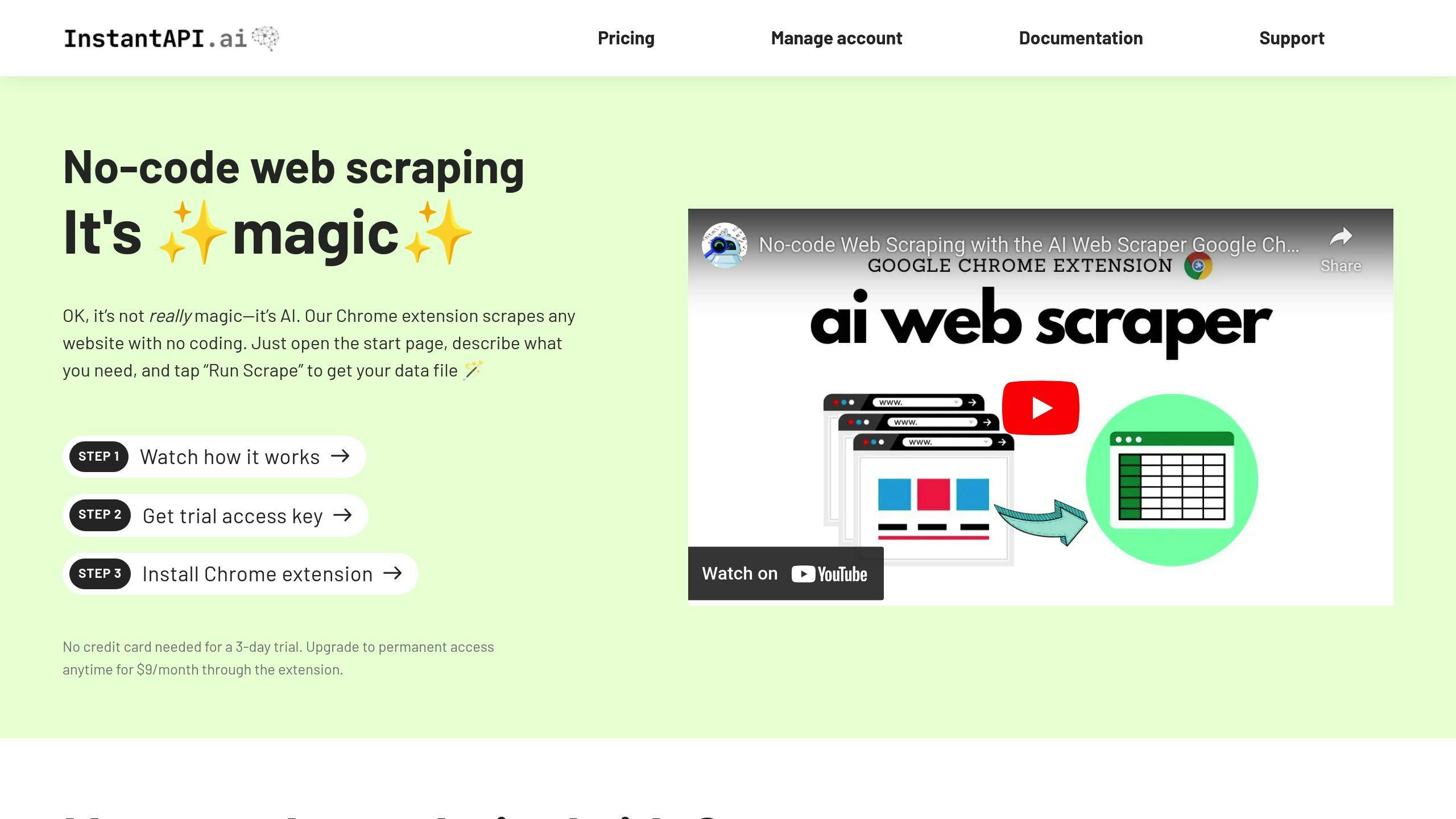
InstantAPI.ai is setting a new standard for ethical web scraping, leveraging AI technology to tackle key challenges responsibly. Here’s how it addresses ethical concerns:
| Feature | Benefit |
|---|---|
| AI-Powered Scraping | Manages server load intelligently to avoid overloading websites |
| Premium Proxies | Prevents IP bans while being transparent about user activities |
| Automatic Updates | Reduces server strain by avoiding excessive retry attempts |
| Built-in Rate Limiting | Ensures web servers aren’t overwhelmed by too many requests |
"The increased focus on ethical considerations in web scraping has driven the development of tools that prioritize responsible data extraction while maintaining transparency with website owners,” says Anthony Ziebell, founder of InstantAPI.ai.
The platform also allows users to customize its functionality, staying in line with ethical web scraping standards:
- Transparent Identity Management: The tool uses clear user agent strings and includes contact information, making it easy for website owners to identify and raise concerns if necessary.
- Resource-Conscious Operations: The system adjusts scraping activity based on website server load and response times, minimizing disruptions. Plans start at $10 per month, ensuring even first-time users can access ethical tools.
- Data Privacy Safeguards: Includes filters to remove sensitive information and ensures secure handling of data, addressing concerns around privacy.
Providers like Merit Data & Technology have noticed that businesses using ethical scraping tools like InstantAPI.ai face fewer blocked requests and build better relationships with the sources they rely on. Additionally, they stay aligned with the ever-changing landscape of data protection regulations.
Example Cases
Real-life legal battles have played a big role in shaping today's approach to web scraping ethics and legality. Two cases, in particular, have left a lasting impression on how data collection is perceived.
HiQ Labs, Inc. v. LinkedIn
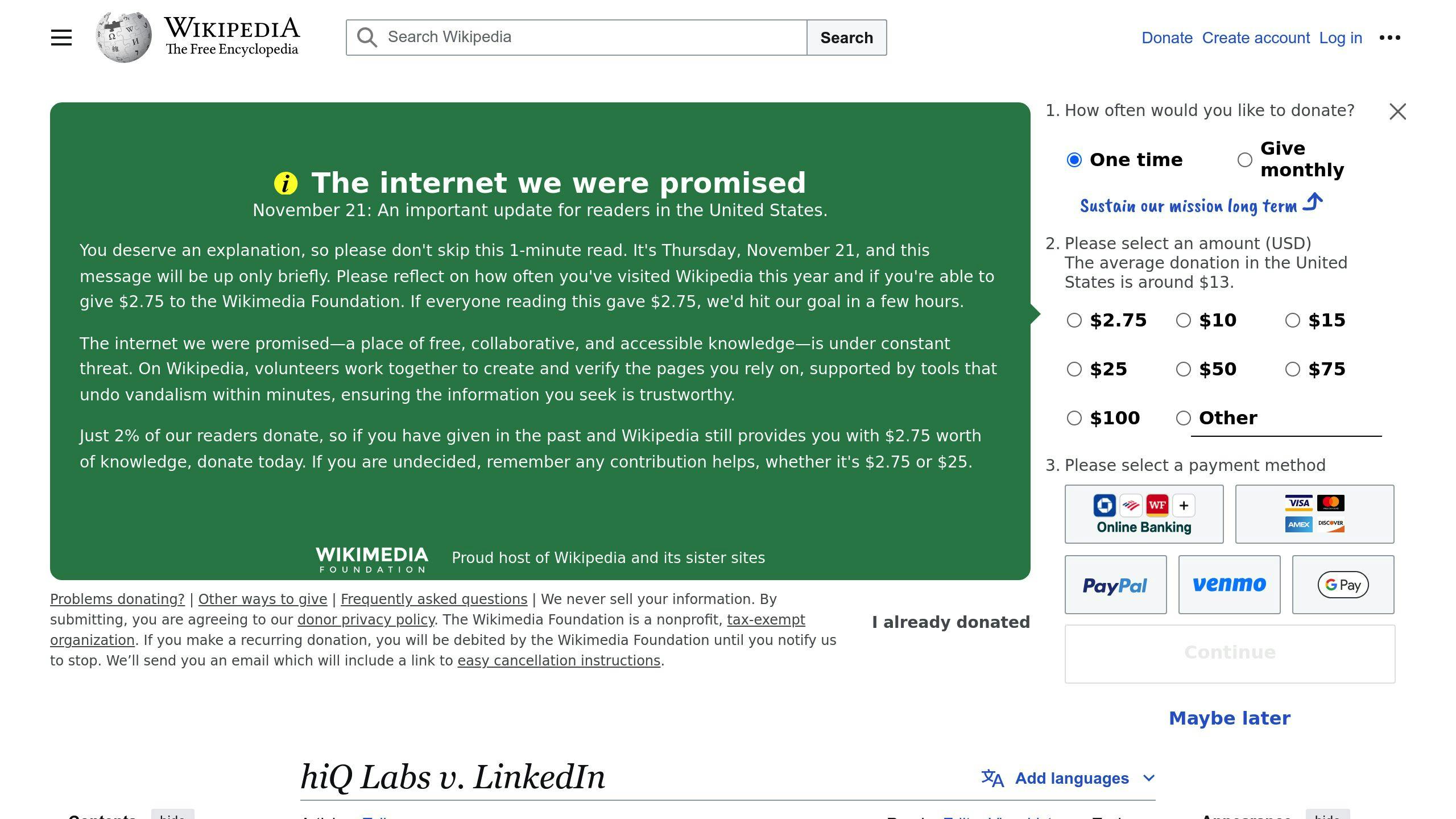
In 2017, HiQ Labs, a talent analytics company, found itself at odds with LinkedIn over web scraping. HiQ was scraping public LinkedIn profiles to gather workforce data for employers. LinkedIn, however, pushed back with a cease-and-desist letter and took technical steps to block HiQ's activities.
"The HiQ Labs case emphasizes the need for web scrapers to respect website terms of service and highlights the potential legal consequences of violating these terms", explains QL2 Blog in their analysis of web scraping practices.
This case led to some pivotal rulings:
| Topic | Key Takeaway |
|---|---|
| Terms of Service | Underscored how serious platform policies are |
| Accessing Public Data | Sparked debates over scraping publicly available info |
| Anti-Scraping Tech | Stressing the need to respect such mechanisms |
| Legal Framework | Set ground rules for handling web scraping issues |
Cambridge Analytica and Facebook
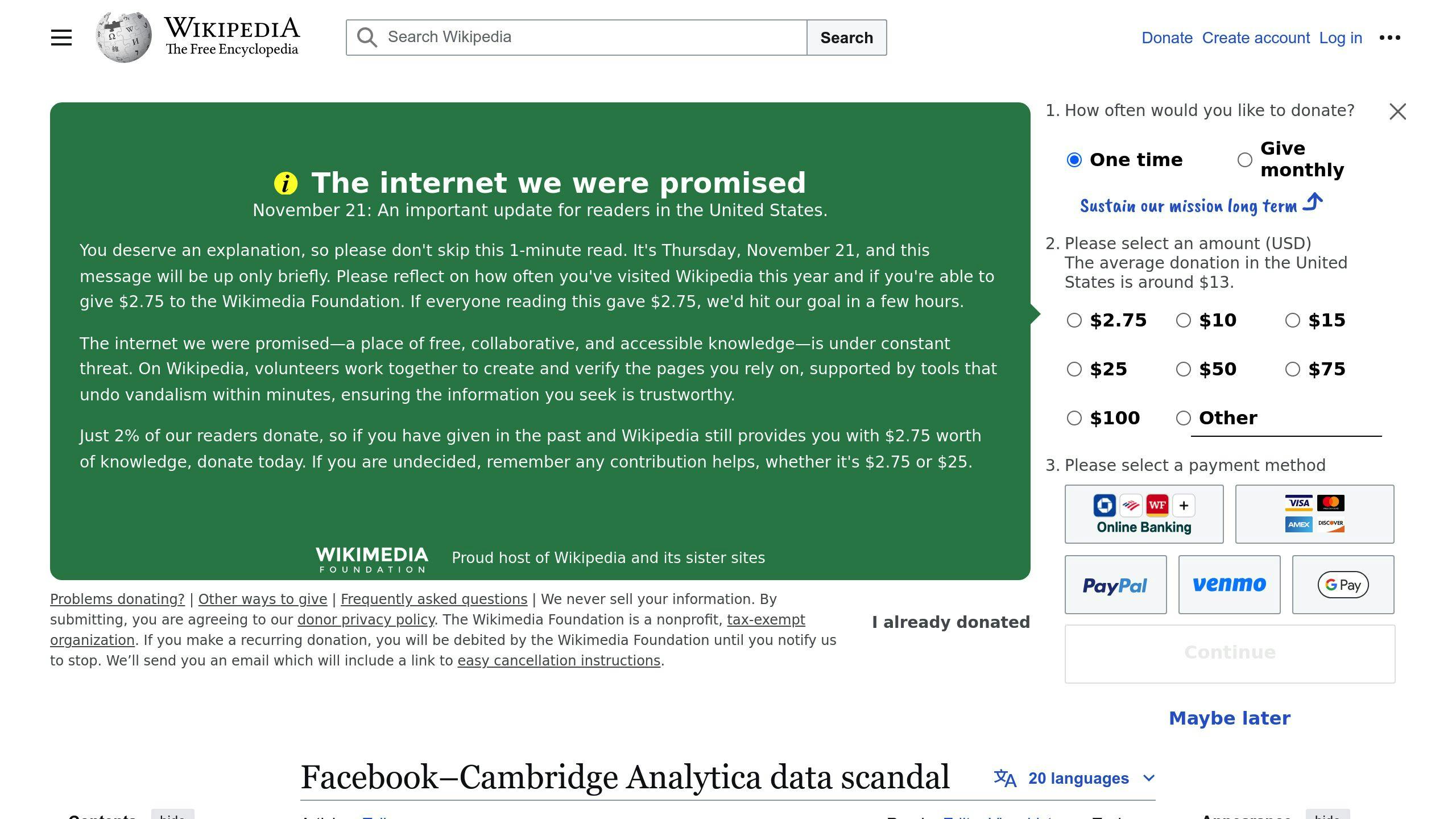
In 2018, the Cambridge Analytica story broke headlines for exposing Facebook’s data vulnerabilities. The company harvested user data without approval, affecting millions and triggering global outrage over privacy.
This case highlighted critical areas:
| Topic | Lesson Learned |
|---|---|
| Data Privacy | Exposed how harmful unauthorized data collection can be |
| User Consent | Reinforced the need for transparency in gathering user data |
| Penalties | Showed that misuse could lead to hefty fines and legal action |
| Industry Reaction | Prompted platforms to tighten data access rules |
"The Cambridge Analytica scandal serves as a crucial reminder of the ethical and legal risks associated with unauthorized data collection and misuse", ForageAI Blog points out in their analysis.
In response to these cases, the industry now operates under stricter data regulations and higher moral standards. Businesses are under greater pressure than ever to use ethical and transparent methods when collecting data online.
Summary
Key Points
The ethics surrounding web scraping have come a long way, influenced by legal developments and evolving industry practices. Ethical scraping hinges on balancing data collection needs with responsible actions.
Here’s a breakdown of best practices for ethical web scraping:
| Area | Best Practice | How to Do It |
|---|---|---|
| Permission | Get explicit consent | Use available APIs; follow robots.txt rules |
| Data Collection | Reduce server strain | Set reasonable scraping rates |
| Transparency | Be clear about identity | Use accurate User Agent strings |
| Security | Safeguard collected data | Apply strong security measures |
Accountability has taken center stage in the world of web scraping. Companies are now expected to be more transparent and respectful towards data sources. This includes creating formal Data Collection Policies that define clear ethical guidelines.
"The growing emphasis on ethical web scraping practices reflects the industry's commitment to responsible data collection while respecting website owners' rights and user privacy", states the Web Scraping Alliance in their 2024 industry guidelines.
To stay ethical, businesses should focus on:
- Getting Permission: Always obtain approval before scraping - use APIs when available.
- Collecting Responsibly: Only gather what’s essential and limit server strain.
- Being Transparent: Clearly identify your scraping activities.
- Prioritizing Security: Protect the data you gather with strong security measures.
For web scraping to have a sustainable future, organizations must balance their data needs with ethical practices. Sticking to these guidelines while staying updated on legal obligations ensures web scraping methods are both efficient and respectful.
FAQs
What are the legal and ethical considerations of web scraping?
Web scraping comes with several legal and ethical factors that organizations need to understand and respect. The main goal is to balance accessing data while honoring website owners' rights and protecting user privacy.
Here are some key considerations:
| Aspect | What to Address | Recommended Approach |
|---|---|---|
| Permission | Follow a website's Terms of Service | Prioritize using available APIs |
| Data Privacy | Comply with GDPR and similar laws | Use strong data security measures |
| Server Load | Avoid overwhelming servers | Use throttling to regulate requests |
| Transparency | Clearly identify as a scraper | Use accurate User Agent strings |
"The growing emphasis on ethical web scraping practices reflects a broader industry shift towards responsible data collection that respects both website resources and user privacy", states the Web Scraping Alliance in their 2024 guidelines.
While personal web scraping often aligns with fair use principles, commercial use requires you to follow stricter legal and ethical standards. For example:
- Follow robots.txt rules.
- Only extract data that's absolutely necessary.
- Protect any stored information with secure methods.
- Be transparent about your scraping activities.
- Create and stick to a formal policy for data collection.
Even if scraping publicly accessible information seems harmless, it’s essential to think about its ethical implications. How might it affect the website’s functionality, its resources, or the privacy of its users? Balancing technical possibilities with these factors is crucial.

